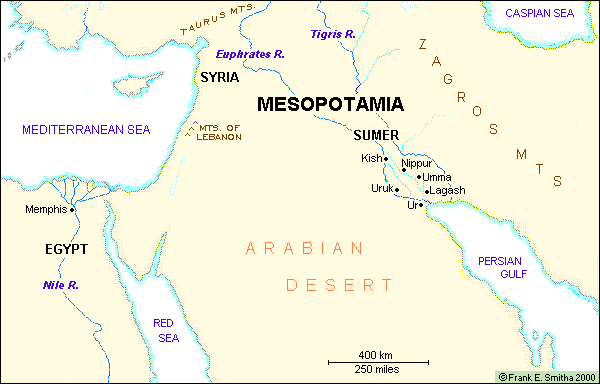From the Prologue we learn that Gilgamesh is the King of Uruk, a city in ancient Mesopotamia--modern day Iraq.

What makes King Gilgamesh so great? Well, he supposedly knows things, all things in fact including secret things--mysteries. The prologue is nonspecific but from our discussion of Plato's "Allegory of the Cave," we know that heroes conventionally know things that the rest of us do not. And Gilgamesh is a traveling man. Obviously he has made a lot of stops all over the world and therefore is "worldly," when compared to the average Joseph living back in Uruk. Gilgamesh has braved the wild. Anyone who ventures into the wilderness in the negative sense experiences hunger and thirst, is a victim to beasts such as Scorpion-Man. In the howling wilderness mythic creatures, lions, monsters, and Lilith the night hag dwell. The presence of these monsters and beasts means that these places are still in a state of savage chaos. Still heroes risk it. The wilderness motif: the wilderness is never presented as a goal in itself, but as a setting for a heroic "rite of passage." Heroes are a nomadic bunch in general, always going on quests into the unknown. Star Trek motto: "To go where no one has gone before." (It used to be "where no man has gone before," but this phrase is obviously updated to include women and Disney characters.) That is, traditionally in mythology the heroic quest was exclusively the domain of men.
Gilgamesh is a storyteller which makes him a poet and then a writer. So if he carves out in stone this very story (using cuneiform), then who is the "I" in the prologue? Is it Gilgamesh himself? If so, he is using third person to describe himself, like Tolstoy or Thucyidides, and consequently is engaging in his own apotheosis (lasting divine fame).
He has a perfect body. Beautiful guy. And he is courageous. No problem here--straight forward description of a hero. Interestingly his beauty also terrifies. First simile ever here: "like a great wild bull." Well I don't know for sure about the great wild bull--the bull symbolizes agricultural society and the beginning of animal husbandry and carnivious systems--but, as a man, I do understand how beauty can terrify.
Gilgamesh's genealogy is strange. He is two thirds god and one third mortal. How is this possible? Why would the gods do this? When the story turns toward death and Gilgamesh goes on a journey (in order to understand it), we begin to suspect that, even though only one third of this demigod is mortal, when it comes to death, being mortal is decisive. Gilgamesh eventually dies. But more so, we have discussed archetypes and Gilgamesh's genetic division into thirds is a form of triad which functions as a kind of symbol too. But of what? Here's one possibility. We know that later, much later, heroes in Greek Mythology are half and half. Achilles is a salient example. Do the math. Between Gilgamesh (2700 B.C.) and Achilles in Homer (750 B. C.), humans pick-up or claim a little more of the divine as mortal. As a signifier of a transformation of human consciousness, in narrative time, our heroes have become more godlike or at least our heroes have converted a small part of what is godly into what is mortal. This transformation comes to a screaming halt with Monotheism. The Hebrew heroes are never part god. Man and God are separate entities which is a radically different way of seeing the world than in the world of polytheism where man and gods overlap in physical form. Monotheism forbids man to be part deity.
In the stories among ancient Hebrew people, god travels with man for forty years in the wilderness but god is never man himself.
In the Prologue we also learn that Gilgamesh is a creator of cities; he puts Uruk on the map so to speak. Uruk epitomizes the highest of urbanized human achievements, technology at work, coupling religion and craftsmanship.
Chronologically, the Prologue is also nearly the end of the story. In other words, it gives us an older and wiser narrator--Gilgamesh--telling us in a fashion (when we compare the Prologue to Chapter One) that "Uruk was not always so great." In fact the Gilgamesh you meet in Chapter One ("The Coming of Enkidu") is an arrogant, self-absorbed tyrant who has taken the city by force and holds the people as slaves. So what is the story about? Number One on the Critical Thinking Rubric asks us to be aware that stories can be about many things--themes galore--simultaneously. One thing can be said initially: the epic is about how Gilgamesh learns to be a wise king. And by "wise" I mean that he comes to understand his civic responsibility and thus he becomes more capable of seeing his relationship with the people of Uruk as defined by something more honorable than a will to power and suppression.